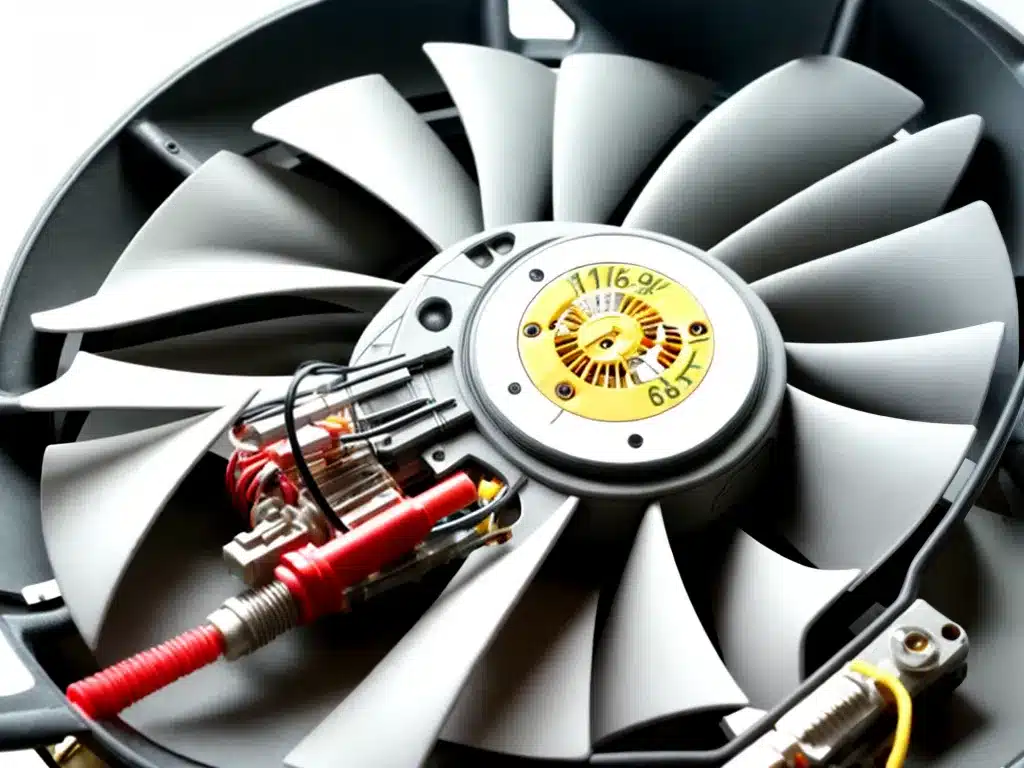Introduction
A noisy computer fan can be annoying and distracting. The constant whirring and clicking sounds can make it difficult to focus while using your computer. Fortunately, there are several things you can try to quiet a noisy fan and improve your computing experience.
Diagnose the Problem
The first step is to figure out exactly where the noise is coming from. Put your ear close to the various fans in your computer to isolate the culprit. Desktop computers tend to have multiple fans – a rear case fan, a power supply fan, a CPU fan, and possibly a graphics card fan. Laptops generally have just one or two internal fans.
Once you’ve identified the noisy fan, try to determine the type of noise:
- A consistent whirring/humming/buzzing sound means the fan bearings are wearing out.
- Intermittent loud grinding or clicking noises indicate a problem with the fan blades hitting a cable or loose screws.
- A rattling noise could mean a loose fan mounting or a fan that is unbalanced.
Clean the Fan
Dust buildup is a common cause of increased fan noise over time. Unplug the computer and use a can of compressed air to blow out any dust from the fan blades and housing. Hold the fan blade still while spraying compressed air directly at the fan motor shaft to dislodge dust.
Be very careful not to spray the air too forcefully, which could damage the fan blades. An old toothbrush can also help gently dislodge caked-on dust. Cleaning allows the fan to spin easier and reduces friction.
Check Fan Mounting and Clearance
A rattling fan noise indicates the fan may be sitting loosely in the mounting brackets. Unplug the computer and open up the case to check that the screws are tightened securely in the fan mounting brackets.
Also inspect whether any cables are sitting too close to the fan blades. Tie back or re-route any cables that could be interfering with the fan rotation.
Replace Fan Bearings
If cleaning does not fix the whirring/humming/buzzing noises from a fan with worn out bearings, you will need to replace the actual fan unit. For desktop PC case fans and CPU fans, you can easily find a replacement online for about $10-20.
Replacing a laptop fan is more challenging and will require disassembling the laptop base to access the fan. An exact replacement laptop fan can cost $40 or more. Depending on your laptop, it may be worthwhile getting professional repair service for fan replacement.
Adjust Fan Settings in BIOS
For minor fan noises, tweaking the fan speed settings in the BIOS settings interface can potentially help. Enter the BIOS menu on bootup and look for options like “Smart Fan Control”, “Fan Speed Control” or “Fan Acoustic Management”.
Lowering the fan speeds could reduce noise while still keeping temperatures adequate. However, make sure to stress test the CPU and GPU and monitor temperatures to ensure they remain in safe operating ranges.
Use Noise Suppression Software
Programs like Noisetorch can help electronically suppress fan noises using noise cancellation technology. This software runs in the background and filters out ambient noise from fans while leaving speech unaffected.
Settings can be customized for the specific fan noise frequency to block. This helps make computer noises less distracting without actually fixing the root cause.
Replace the Fan
For fans that are constantly loud even after cleaning and troubleshooting, replacing the entire fan unit may be necessary. Fans eventually wear out over time. Replacement case fans are inexpensive, but replacing proprietary cpu/gpu fans can be more costly.
Make sure the new fan has adequate airflow and RPM capabilities for your system. Also pay attention to the physical size and mounting to match the original.
Summary
- Diagnose which specific fan is causing noise and the type of sound.
- Clean fan blades and housing of dust buildup using compressed air.
- Check that fan is securely mounted and cables are not interfering.
- Replace worn out fan bearings or unbalanced fans.
- Adjust fan speeds in BIOS settings, if possible.
- Use noise suppression software like Noisetorch.
- Replace the fan entirely if necessary.
A bit of troubleshooting can go a long way towards silencing a noisy computer fan and restoring your peace and quiet. With some simple cleaning and maintenance, minor fan noises can usually be remedied easily. For persistent loud fans, replacing the fan unit itself will be the most effective solution.













